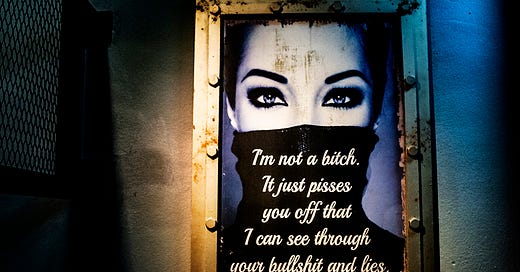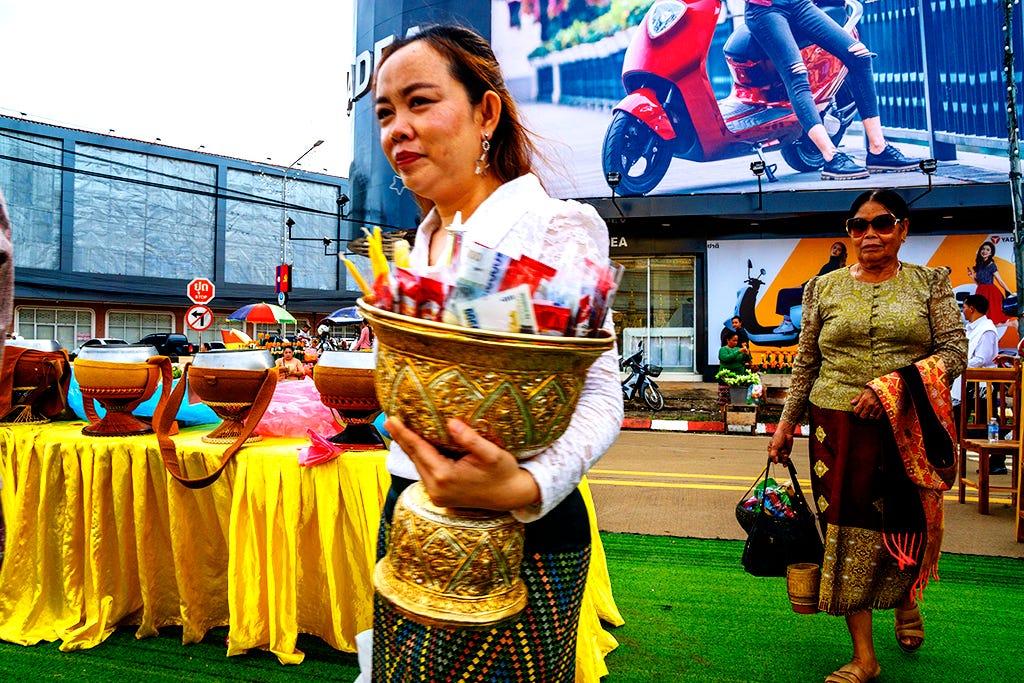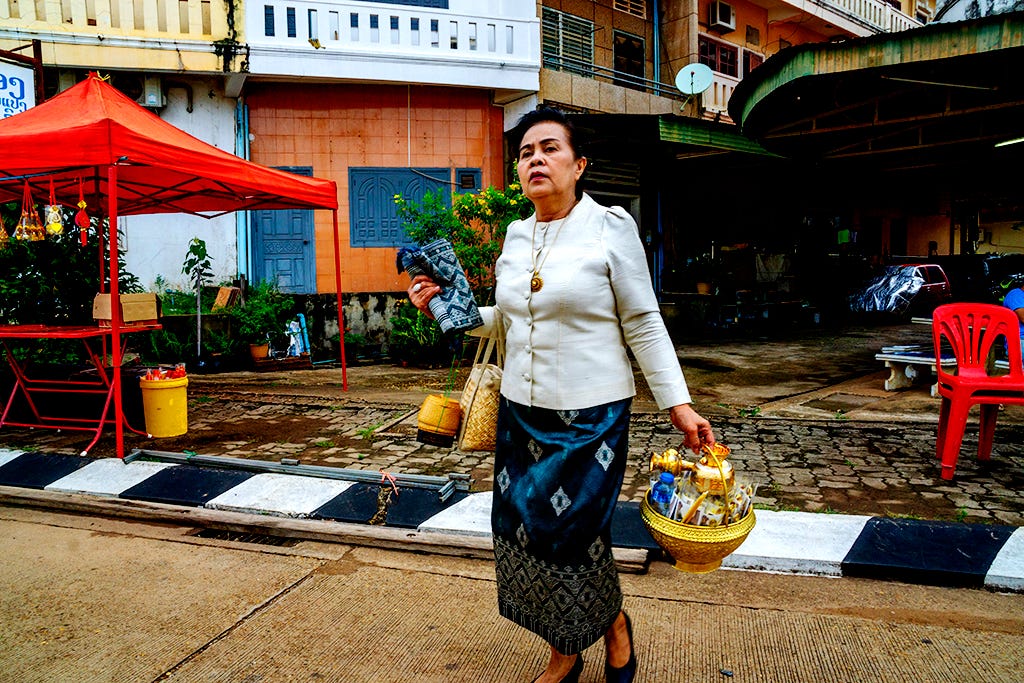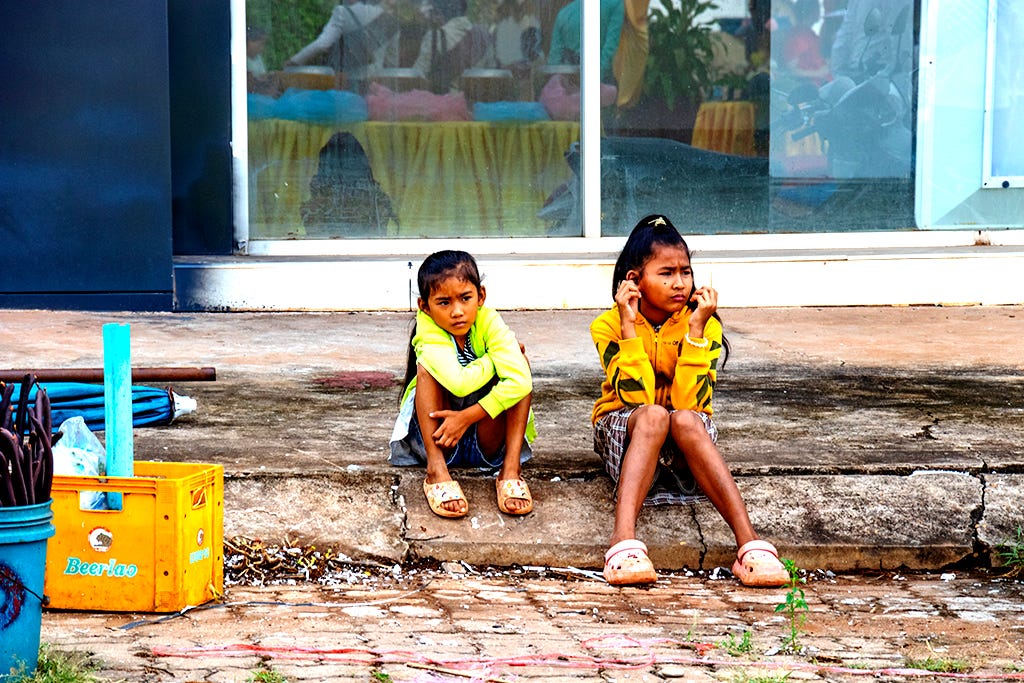[Vientiane, 1/16/20]
Shanghaied onto this Jewjab Genocide cruise to hell, we must contend with lesser swindles.
Due to lockdowns, supply chain disruptions, energy cut offs, social chaos, unchecked crime, porous borders, untilled land and sabotages of infrastructure, billions of people will become refugees, and keep in mind these include internal ones, such as those millions who have fled California. Among the adrift will be crooks of all kinds, for homeless desperation has always been their hotbed.
Cormac McCarthy’s classic novel of civilization in ruins is The Road. In it, a father and son must constantly move on to search for food while avoiding dangers from other humans. It is a world so desolate, no animal can be seen, not even birds.
The only cat is the remains of a meal, “In the livingroom the bones of a small animal dismembered and placed in a pile. Possibly a cat.” The only dog is heard from afar, with the fictional boy still sentimental, “We’re not going to kill it, are we Papa?”
The only predators left, then, are men. They’re also your most ready source of protein. It’s a man-eat-man world, with scavenging your only other option, but there are only so many cans of food left. Like oil and everything else, the easy stores have long been ransacked. You will trudge for days without finding anything.
In the early 17th century, Zhang Yingyu published The Book of Swindles. Out of print for +300 years, it’s still obscure in China, but luckily, Christopher Rea and Bruce Rusk have made half of these stories available in English. Their introduction alone is delicious. Here’s the first paragraph:
We live in an age of deception. Words and appearances mislead. Con artists prey on the unwary. The halls of power are choked with hypocrites, and the markets teem with frauds. Every stranger is a potential enemy, and one steps out the door at one’s peril. In this world of swindlers, one must rely on one’s wits to survive. How, then, to guard against the duplicity that seems to lurk behind every smiling face? Look to your kin, keep your possessions close, and trust no one.
With many swindles occurring on the road, Rea and Rusk point out, “Vulnerability increases with distance from home—as does the lure of profit.” They summarize:
Many of the encounters in the Book of Swindles involve a particular and highly charged social scenario: travel among strangers. Porters carry examination candidates only half the promised route and then stop to extort a higher fare. Women seduce merchants far from home, prostitute female relatives, frame innocent men, steal horses on the highway, and enter into sham marriages for purposes of murder and extortion. Waggish literati on pleasure trips seek out and outwit courtesans and officials. Crooks traveling by land and water impersonate rich scions, Daoists, alchemists, and acquaintances of powerful officials in order to fleece merchants and examination hopefuls.
Though all the trappings of civilization, clothing, writing, schools, media and lofty institutions of state, have often been used to deceive, deception becomes even more prevalent outside civilization. City, civic, civil and civilization are related. Outside settlements is the wilderness, a lawless place where barbarity can flare up.
The road, then, has long been a venue for conmen, bandits and hijackers. Ejected from home, millions will be on the road, with each stop only temporary, not unlike what I’m experiencing now. As refugees, most will be repeatedly corralled, then shooed away.
Unlike me, most will transit through societies where there’s little civility or civilization left, even in cities. America is way ahead of the curve. For unique reasons, that mean street in the USA begins with your doormat, even if you live in a multi-million dollar home in Midtown Manhattan.
Hit the road, Jack, and don’t you come back no more, no more, no more. Hit the road, Jack, and don’t you come back no more!
I’m not anticipating any Rousseauian Garden of Eden, obviously. Savages are savage. Even when civilized, we’re often savage enough.
Why, then, do I often claim delight in being among people, even complete strangers with whom I don’t even share a language?
It’s because we aren’t yet plunged into dire scarcity. In most places, there’s still enough to sustain mind and body until the next day, so you don’t want to sabotage your future, however uncertain, by shooting someone in the head. That necessitated thrill must wait.
Here’s a story I’ve heard: On a boat adrift at sea carrying Vietnamese, a woman still had a bottle of water. Sitting next to her, a man begged for just a sip. He hadn’t drank for more than a day. Though filled with premonitions, she handed her water to him. After a generous gulp, he refused to return her half-full bottle. On a betraying face, there’s always a touch of glee, at least. That’s what she saw.
Nothing flips over the nicely appointed table of civilization like war. That’s where we’re headed, on multiple fronts. The main reason for this is, again, scarcity. Grabbing your water, oil, food and women, your enemy won’t just snarl, but kill you. In too many places, that savage energy needs an urgent release.
With his deodorant, mouthwash, perfume, bathroom deodorizer, androgynous clothing, office cubicle, car as carapace, +1000 TV channels, boneless chicken, headless fish and innard-free pigs, contemporary man is mostly removed from the grosser facts of life. This deficit, he partially remedies with an addiction to the sickest porn, so all is well, he thinks. He’s still in touch with his inner savage.
As for violence, he may appreciate Quentin Taratino and Mixed Martial Arts, and he must support the War in Ukraine, since Hitlers must be opposed, but our natty friend is still a pacifist. How can anyone be anything but? Violence is always wrong.
Ignorant of or ignoring the fact that male animals routinely fight for access to food and sex, with the killing of someone else’s offspring also common, he will claim only man murders his own kind, a savage relic that must be overcome.
Starving, even rabbits will kill then eat their siblings. Throughout history, man didn’t even need this excuse.
Though most of the crimes in The Book of Swindles aren’t violent, there’s one outrageous exception.
Appointed tax collector, a corrupt eunuch had enriched himself obscenely, so he lacked nothing but, well, his ding dong. Luckily, a Daoist had a solution, “Cook a young boy, mince his liver, dry his flesh into jerky, and consume his vital marrow. This will cause the semen to replenish and the male organ to regenerate so well that you will even be able to have relations with women and father children.”
Paying the wise man 100 pieces of silver up front, the eunuch sent henchmen to remote, impoverished villages to buy boys, under the pretense he just wanted to raise them as his own.
To sweeten each boy’s meat, he fed each child the finest delicacies, then came the truth:
His chef would later cook the boy and serve him to the eunuch, earning ten ounces of silver per boy for keeping this arrangement strictly secret. Each time he had to kill a boy, the chef would chase them around with a cleaver, and all the boys would weep and cry as they fled before him. The chef would wait until the boys had worked up a sweat and excited their qi, then he would select the fattest boy and cook him.
Though Eunuch Gao ate hundreds of boys, there was still that eternal loneliness down there, where nothing met nothing. This sick feast only ceased when one boy managed to escape, thanks to the chef, who finally felt enough pity and remorse. For allowing this, the chef was beheaded, then Eunuch Gao was decapitated, after his arrest.
To fill a void, many men have done the unspeakable.
To protect his society, family or stock of baked beans, a man will shoot. Like most animals, he’s also territorial. You have to be a wokester or contemporary eunuch to think otherwise.
Consider Thailand. Normally, the Thais are among the most pleasant people on earth. They’re gentle, courteous and, it has become a cliché, always smiling. After Communist victories in Vietnam, Cambodia and Laos in 1975, floods of refugees from all three countries kept arriving in Thailand for years. By land and sea, they surged in.
Though the Thais tried to accommodate these foreigners at first, they quickly turned nasty, with soldiers turning away refugees at gunpoint. Worse, they allowed Thai fishermen to rob and rape boat people at will. Life under Communism was so bad, however, desperate people kept coming, so Thai soldiers marched many refugees back, into Laos and Pol Pot ruled Cambodia.
As refugees, you can expect other nations to act much worse than Thailand did, for we’re entering the Brave New Reset, where the only thing not lacking will be desperate, angry people lusting for food, fucking and revenge.
Here and there, though, there’ll be oases of normality. Remember that?
Cognitively impaired by Jewjabs, you have already forgotten. Your brain, body and world have irreversibly changed.
Cormac McCarthy, “The world shrinking down about a raw core of parsible entities. The names of things slowly following those things into oblivion. Colors. The names of birds. Things to eat. Finally the names of things one believed to be true. More fragile than he would have thought. How much was gone already? The sacred idiom shorn of its referents and so of its reality. Drawing down like something trying to preserve heat. In time to wink out forever.”
In The Road, the father and son never ceased to love and trust each other completely.
Sounds like science fiction.
[Pakse, 5/29/23]
[Pakse, 5/29/23]
[Pakse, 5/29/23]







I wish I could make a small contribution. I've recently turned 65 and I'm on a very small Social Security fixed income that is not even adequate to pay fully for the room I rent in a house in what is essentially a ghetto. Last year in an interview the Social Security bureaucrats promised me a slightly better, higher monthly stipend. If I can get that raise I will contribute. In the mean time best regards, Linh Dinh and please keep writing and speaking the truth in a world of deceit.
I have read a lot of Cormac McCarthy, and “The Road” is his darkest piece by far. The world of “The Road” is dark and horrifying without any relief at all other than the father-son relationship itself. But the end is perhaps the most thought-provoking.
The death of the father is heartbreaking, and then the son fortuitously meets up with what will become his new “family.” What makes it thought-provoking to me is that on its surface, the end seems somewhat hopeful, until you ponder it a bit and realize that a world like that has absolutely no room left for hope—things will never get better in a lasting way. But then you must ask yourself--what really lasts in this world? Isn’t our hope that something better will take hold and endure just a question of how long a view we take?
Those that take the time to truly observe what is going on around us sense the train wreck that is coming. Their reactions vary. Some believe they can “ride it out,” and might even try to prepare somehow. Others stay in denial or avert their gaze. Still others hope, with some mixture of fear and selfishness, that things will somehow hold together long enough that they won’t have to be there for the end.
Yet many go blissfully on their way, and when they see or hear of anything disturbing, or experience that occasional mental dissonance, dismissively wave it off and convince themselves that somehow it will all work itself out. I guess it will, but likely not to their satisfaction. All things end, but not all things end well. As the ZeroHedge banner says, “On a long enough timeline, the survival rate for everyone drops to zero.”